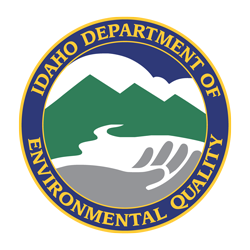Permitting authority for storm water permits will transfer to DEQ from EPA on July 1, 2021. Until that time, continue to work with EPA as the permitting and compliance authority (e.g., submitting NOIs, NOTs, reports, etc.). Prior to July 1, DEQ (and EPA) will provide information and instructions regarding the transfer from EPA to DEQ, along with permittee training opportunities, and official discharge authorization letters.
Storm water is rain or melting snow that does not immediately soak into the ground. Storm water runs off of the land and hard surfaces (e.g., streets, parking lots, rooftops) and picks up pollutants (e.g., fertilizers, dirt, pesticides, oil, grease). Eventually, storm water soaks into the ground or discharges to surface water (usually through storm drains), bringing pollutants with it. Federal, state, and local government agencies, businesses, industries, and individual landowners all share responsibility for storm water management. Storm water permits are typically general permits and cover storm water runoff from construction projects, industrial facilities, and municipal separate storm sewer systems (MS4).
DEQ requires permit coverage of storm water discharges according to the applicable federal requirements. DEQ will apply the regulatory criteria in IDAPA 58.01.25.130 to determine which permit type to issue. Three categories of storm water discharges are covered in the IPDES Program: construction, industrial, and municipal activities.
This accordion will not appear on the screen
Materials and equipment handling and storage activities at industrial facilities are often exposed to the weather. Runoff from rain or snow that comes in contact with these activities may pick up sediment and pollutants and transport them to a surface water body.
Industrial activities under 40 CFR 122.26 (b)(14) are regulated under the multisector general permit (MSGP), unless due to ineligibility (e.g., construction) or if an individual or alternate general permit is required. DEQ will evaluate compliance and effectiveness of this permit, along with experience of other state NPDES programs (e.g., Oregon, Washington) to determine whether general permits for one or more specific industrial sectors are appropriate.
Construction activities are often exposed to the weather. Runoff from rain or snow that comes in contact with these activities may pick up sediment and pollutants and transport them to a surface water body.
Discharges from construction activities that disturb one or more acres, including discharges from smaller sites that are part of a common plan of development or sale that disturbs one or more acres, must obtain permit coverage. Construction storm water permits include requirements for erosion and sediment control, pollution prevention, and site stabilization from the Construction and Development Effluent Guidelines and Standards (40 CFR 450).
Construction sites seeking coverage under the construction general permit (CGP) must develop a storm water pollution prevention plan (SWPPP) to document the temporary and permanent best management practices (BMPs) to be used on the site to reduce or prevent the discharge of pollutants. The SWPPP should document where all BMPs are installed, the site’s discharge points, who is responsible for implementing the SWPPP, and training and maintenance records associated with the SWPPP.
Find our permits on the Issued Permits and Water Quality Certifications web page.
Municipal separate storm sewer systems (MS4s) are regulated as large/medium (Phase I) or small (Phase II) systems. Phase I systems are defined by cities or certain counties with populations of 100,000 or more. Phase II systems are defined as urbanized areas by the US Census Bureau. DEQ will evaluate other small MS4s designated for regulation based on the IPDES Designation Criteria and Selection Process for Small Municipal Separate Storm Sewer Systems, as well as criteria and models developed by other states and EPA Region 10.

